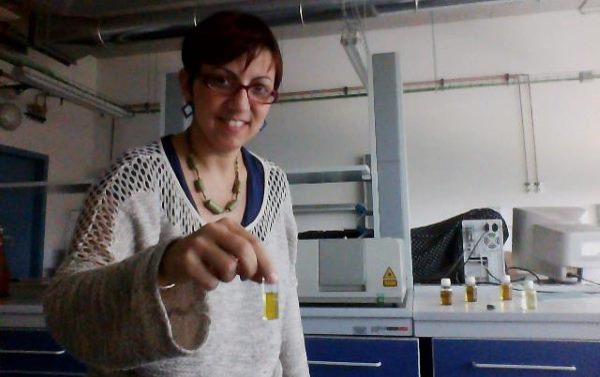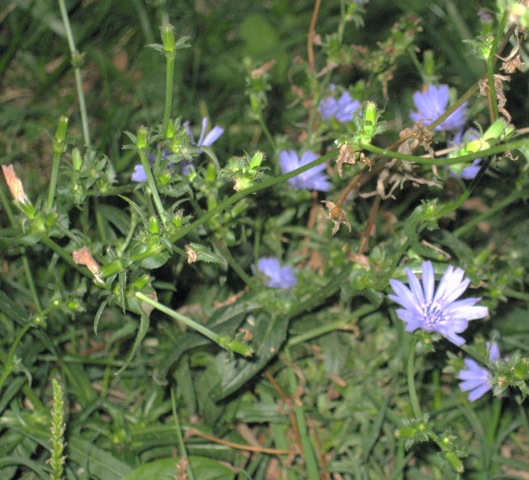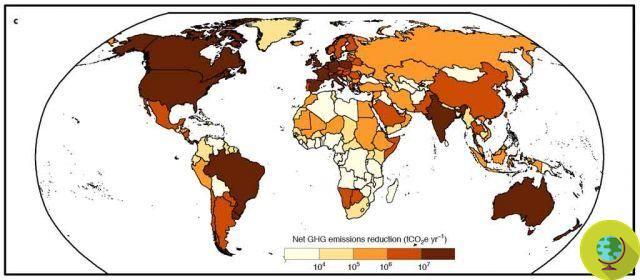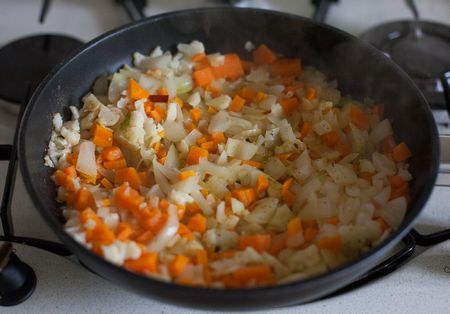A rapid global elimination of livestock farming would have the potential to stabilize greenhouse gas levels for 30 years and offset 68% of this century's CO2 emissions. Nutritionally balanced plant dominance diets are quite common, but are rarely considered in comprehensive strategies for mitigating climate change, and there is controversy over their feasibility and magnitude of their climate benefits.
Don't store avocado like this: it's dangerous
What would happen if we no longer sacrifice all our lands to make them farms and crops necessary to support it? Animal agriculture contributes significantly to global warming through continued emissions of potent greenhouse gases, methane and nitrous oxide, and the shift of biomass carbon to land used to support livestock. So what if we all became vegetarians?
This is asked in an article published in PLoS Climate by Patrick Brown, of Stanford University School of Medicine, and Michael Eisen, of the University of California at Berkeley. In the research, scholars quantify the entire "climate opportunity cost" of current global livestock production, modeling the long-term combined effects of emissions reductions and biomass recovery that would be unlocked by phasing out animal agriculture.
Read also: Each of us can become a “climate refugee”, but COP26 will try to reverse the course (INTERVIEW).
We show that, even in the absence of other emission reductions, persistent drops in atmospheric levels of methane and nitrous oxide and a slower accumulation of carbon dioxide, following a gradual abandonment of livestock production, would have, until the end of the century, the same cumulative effect on atmospheric warming potential as a 25 gigatonnes per year reduction in anthropogenic CO2 emissions, providing half the net emission reductions needed to limit warming to 2 ° C, the research reads.
The magnitude and rapidity of these potential effects should put the reduction or elimination of animal agriculture at the forefront of strategies to avoid disastrous climate change.
A systematic review
The Food and Agriculture Organization of the United Nations, FAO estimates that emissions from animal agriculture represent about 7,1 Gt CO2 eq per year (where CO2 equivalent - CO2 eq - is a measure that evaluates the impact of a ton of greenhouse gases compared to the same amount of CO2 and Gt is equal to Giga tons = billions of tons), 14,5% of annual anthropogenic greenhouse gas emissions. Recent estimates suggest that in the order of 800 Gt CO2 the carbon equivalent could be fixed through photosynthesis if the native biomass were allowed to recover on 30% of the earth's surface current dedicated to animal production.
So roughly, the elimination of animal agriculture has the potential to reduce net emissions by the equivalent of about 1.350 Gt of CO2 this century. To put this number into perspective, the total anthropogenic CO2 emissions from industrialization are estimated to be around 1.650 Gt.
The researchers thus studied the data produced in recent years and then developed a model that takes into account all emissions related to farming, also taking as a variable the effect of reintroduction of woods and forests, which would absorb huge amounts of greenhouse gases. The estimate considered, as we said, actually assesses that, if 30% of the earth's surface currently used for farming were covered by the original biomass, the fixation for photosynthesis of 800 giga tons of CO2 would be obtained.
Read also: Plant-based "meats" in US fast food restaurants saved more than 600 animals in 2021 according to this new report
The scenarios hypothesized in the study are:
- the immediate abandonment of all flesh
- a more progressive conversion over 15 years
- a version for each of the two scenarios that provides only the farewell to ruminant breeding, especially cattle
Well, according to this analysis, 90% of the reduction in emissions could only be achieved by eliminating ruminant farming. In addition, if meat were to be completely abandoned in the next 15 years, with the consequent elimination of the relative emissions of nitrous oxide and methane, there would be a 68% reduction in carbon dioxide emissions by 2100, even if all other emissions were to remain unchanged. According to scholars, therefore, this would be a reduction greater than the 52% cut considered necessary to stop heating at 2 ° C above the temperature of the pre-industrial era, i.e. at the safety threshold to avoid disastrous effects.
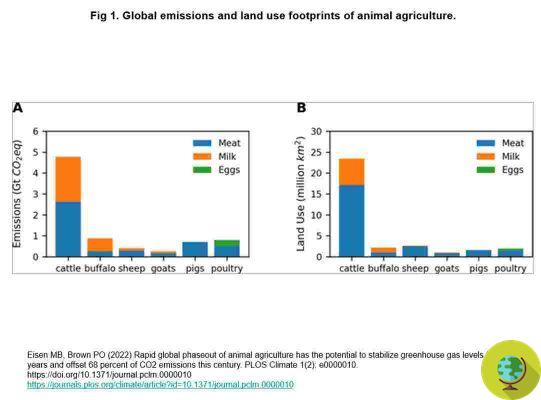
©PLoS Climate
The authors do not dwell on the social effects that this change could have, especially in the poorest countries, and recognize that it would also be necessary to plan a reconversion of the activities of human beings whose livelihood is linked to livestock.
At the conclusion of the analyzes, Brown and Eisen ask that among the objectives of the IPCC, the international body dedicated to the analysis and search for solutions against the climate crisis, the reduction o l’elimination breeding and associated agriculture.
Daring and surreal? Well at this point it should be noted that the two researchers are also the founders of Impossible Food which produces vegetable meat substitutes. The study, therefore, does not seem exactly super partes, but it remains a starting point on which we should all reflect.
Follow your Telegram | Instagram | Facebook | TikTok | Youtube
Source: PLoS Climate
Read also:
- We are destroying plant and animal species at a rate 1.000 times faster than the natural rate
- Deforestation: so your consumption habits are causing the loss of 4 trees per year
- At risk of extinction as many as 600 species of animals more than expected. I study
- Mass extinction risk for marine animals, due to intensive fishing (VIDEO)
- If we don't stop eating meat right away, we will face a climate catastrophe. The shock report








